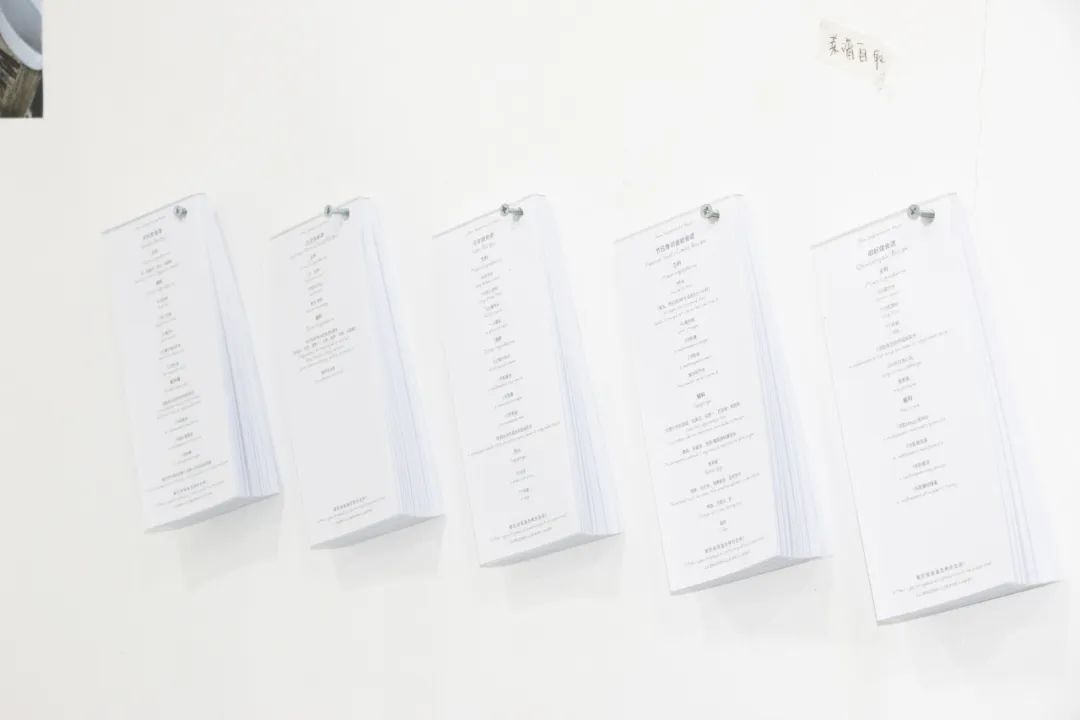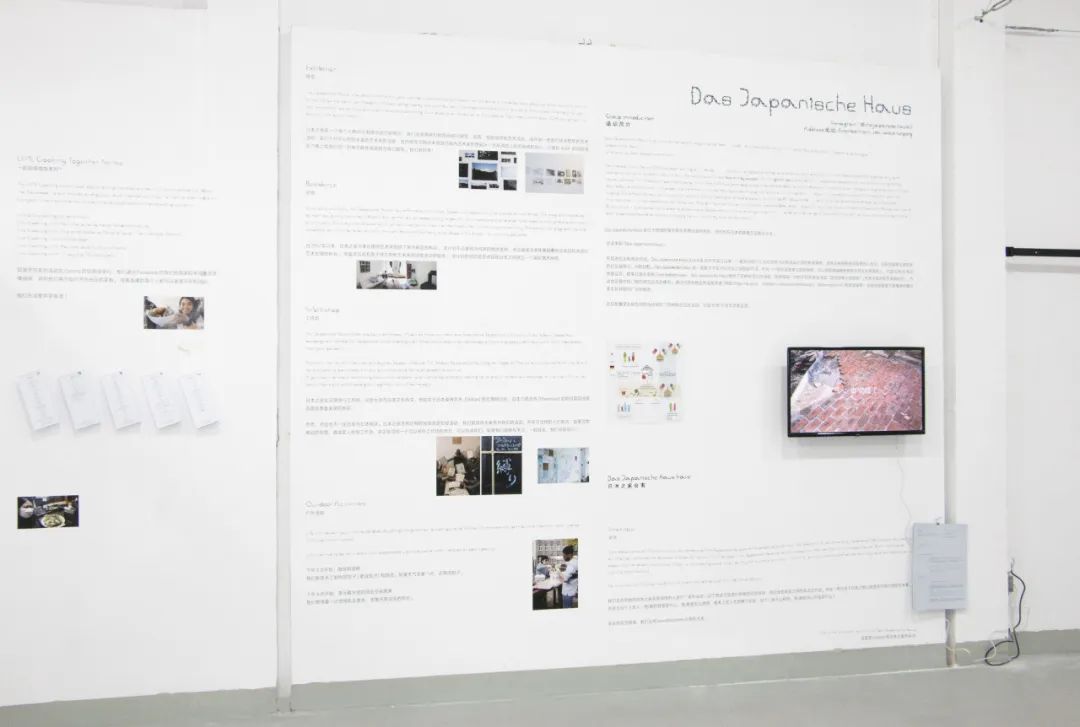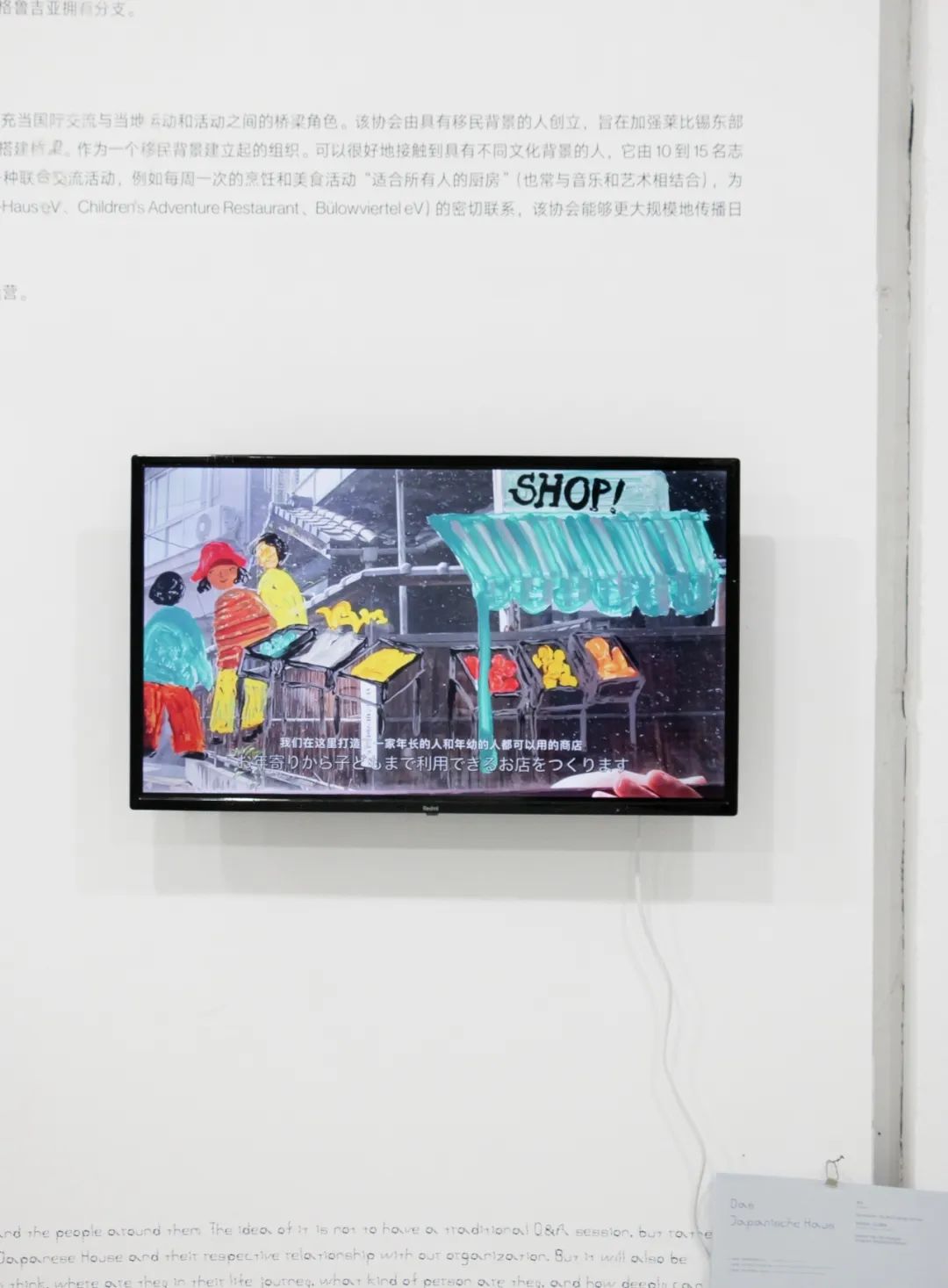cusp.talk : Das Japanische Haus
L:采访者 , 卡斯普多特的朋友 Lana
L:Interviewer, cuspdot’s friend, Lana
J:被访者,日本之家七年之久的成员 Jens
J:Interviewee, seven-year member of Das Japanische Haus, Jens
D:被访者,日本之家的成员,Danyyel
D:Interviewee, member of Das Japanische Haus, Danyyel
L:Interviewer, cuspdot’s friend, Lana
J:被访者,日本之家七年之久的成员 Jens
J:Interviewee, seven-year member of Das Japanische Haus, Jens
D:被访者,日本之家的成员,Danyyel
D:Interviewee, member of Das Japanische Haus, Danyyel

L:
你能介绍一下日本之家以及你们是做什么的吗 ?
Could you introduce us a bit about "Das Japanische Haus"?
J:
日本之家成立于 2011 年。对于这样一个组织来说,它已经存在了相当长的时间。很多其他类似的组织在莱比锡可惜都没有坚持下来。我们在日本尾道市有一个类似的项目,即“尾道之家”还有一个在格鲁吉亚的第比利斯,“乌祖之家”( UZU House)。两者都是由曾经和我们的人创立的。这将是一个遍布全球的“特许经营”。
Das Japanische Haus ( The Japanese House ) was founded in 2011. For such a non-profit organization, it has been around for quite a long time. Many other similar organizations sadly vanished in Leipzig. There is a similar project in Japan in Onomichi, the Onomichi House, and another in Georgia in Tbilisi, the Uzu House. Both were founded by people who were once with us. This will be a franchise across the whole world.
一条幸福的链条!而不是一条资本主义的链条。
A Happy Chain! Not a capitalist chain but a non-profit chain.
L:
一个非盈利的连锁店。
A non-profit chain store.
J:
是的,没错,非盈利的连锁店。这就是它的本质。( 笑)
That's exactly what it is, A non-profit chain. (laughs)
它是由两位日本建筑师 Yu Otani 和 Noriko Minkus 创立的,他们两位来到德国工作,发现德国有很多的空房子。他们想知道如何更好地利用这些空间,为什么这么多地方都空荡荡的,却没有人利用。他们一开始的目标就是努力展示如何利用这种遍布世界各地的空闲空间。房屋年久失修,无人问津,实在令人遗憾。
The project was founded by two Japanese architects, Yu Ohtani and Noriko Minkus. Two architects who came to Germany to work here. You can say that simply. You saw that there were a lot of empty houses at that time. And they asked themselves how they could use them better. Why is there so much vacancy and no one does anything with it? The aim of the two of them was to show at the beginning how one can use such open spaces, which exist all over the world. It's such a shame when houses fall into disrepair even though they could be used for other purposes.
他们在其中一栋空建筑中租了一个房间,将这个项目起名叫“日本之家”,只是想看看它可以如何发展和能用这个空间做些什么。一开始,他们从建筑学的角度处理它。他们组织了相关的展览和研讨会,关于如何开发闲置空间,促进城市地区的发展,这就是他们的背景和初衷。
Back then, they simply rented a room in one of the empty buildings, called the project The Japanese House, and simply wanted to see how it developed and what they could do with it. They initially approached it from an architectural perspective. We held exhibitions on the topic, workshops on how to develop open spaces, and how to promote the development of districts, that was the background.

一段时间过后,对于现在回到日本并领导我们第三个项目的 Yu Otani 来说,觉得这种方式过于的片面,因为他意识到这种方法只能让他吸引一些特定的受众,而不是生活在其中的本地的人们。
After a while, it became too one-sided for Yu Ohtani, who is now back in Japan and is leading our third project there, because he realized that this approach only allowed him to get to know a specific audience, not the people who live locally.

在某个时候,他想到了 KÜFA( 适合每个人的厨房)的想法。共享烹饪活动,每个人都可以参加。一开始,他们都是彼此相处,主要做日本菜。然后这件事上了莱比锡的丛林电台,许多人告诉其他人,消息很快就传开了。突然间,来自该地区的 100 人、150 人、有时甚至 200 人来这里做饭和吃日本料理。多年来,这已经演变成我们每周两次开放厨房(KÜFA),我们为大家做饭,也欢迎任何想做饭的人前来一起做饭,然后一起吃饭。之后,我们会举办一些活动,如即兴表演、讨论之夜、电影之夜、音乐会或展览。这些活动完全不同,但通常都是自发随性进行的。
At some point, the idea of KUFA (kitchen for everyone) came to his mind. A shared cooking event and everyone can take part. In the beginning, they were among themselves and cooked mostly Japanese. Then it happened over the Leipzig bush radio (many people tell others) word got around very quickly. And suddenly 100, 150, or sometimes even 200 people from the area were there to cook and eat Japanese food. And so it has developed over the years that we do KUFA twice a week. Anyone who wants to can help with the cooking and then we can eat together. Afterward, there is often another event, either a jam session with various musicians or a discussion evening or a film is shown or a concert or an art exhibition. Completely different, often it arises spontaneously.
这件事的好处在于,它完全没有压力也没有规则,所以任何人都可以来,无论他们来自哪里,信仰什么宗教,性别如何,性取向如何,都没有关系,他们只是来这里度过一段美好时光,这就是它的意义所在。
The nice thing about this whole thing is that there is no pressure or regulations. Everyone is allowed to come to us, no matter what country they come from, no matter what religion they belong to, what gender they are, what sexual orientation, and so on, it doesn't matter. This is where people come to have a good time. It's all about this.
有趣的是,烹饪也能让人开心,让人们开始互相交流对话。这也是我们目前的主要工作,将来自不同文化背景的人们聚集在一起,让大家知道阿拉伯人并不坏,叙利亚人也不卑鄙,德国人并不都是纳粹分子,性少数群体也是完全正常的人。我们想要打破所有这些偏见,这是我们最关心的问题。
And it works, it works through cooking, cooking together brings people together, and people start talking. And that is our main work and intention: to bring people from different cultures together and show that, for example, “the Arab” is not bad, “the Syrian” is not mean, “the Germans” are not all Nazis, gays and lesbians are completely normal people, etc. We want to break down all these prejudices, that is our main concern.
L:
感谢你的介绍。这真是太棒了。我想了解一下,之后的事情是如何发展的?例如乐队,你们是如何找到他们的?还是有人主动来找你们?
Thanks for the introduction. This is awesome. I would also like to know how the events come about after eating together. So, for example, how do you reach the band that is playing a concert with you? Or do people contact you when they want to play a concert?
J:
现在很多人主动找到我们。我们受宠若惊,尤其是一些年轻,不知名的乐队,他们想演奏或寻找演出机会,还有一些艺术家。就在你来之前,我刚刚收起了一位年轻的伊朗艺术家在这里展出一批他的作品。我们收到了很多这样的请求,因为在莱比锡,像这样可以免费展示自己的地方并不多。世界各地都缺少这样的地方。莱比锡的情况还是不错的。但在这里,中产阶级化正在开始,越来越多的项目不得不被放弃。
I have to say, we are now in the luxurious position that people come to us. We are overwhelmed with requests, especially from young, unknown bands who would like to perform, but also from artists who would like to exhibit. Just before you came, I took down the pictures of a young Iranian artist who had exhibited his paintings here for three weeks. We receive a lot of inquiries; there are not many places like this in Leipzig where you can present yourself for free. Such places are simply missing everywhere in the world. Things are still quite good in Leipzig. But here too, gentrification is setting in and more and more projects have to be abandoned.
L:
为什么城里这些自组织在逐渐削弱,消失呢 ?
Why do more and more projects have to be abandoned?
J:
中产阶级化,这意味着长期居住在该地区的人们因租金上涨而被迫离开该地区。我们也被赶出了原来的房子,因为接手的下一个租户付的房租是我们付的四倍,而现在他又解约了,那间房子现在又空了。我不理解,真的很荒唐,为什么要这么做?我们身边很多自组织确实正在消亡。可悲的事情就是这样,这些地方变得越来越少,我们现在能顶得住,但我也不知道到底能坚持多久。在租赁市场上,钱才是最重要的。但这在任何地方都是如此。
Gentrification means that people who have lived in the area for a long time are forced to leave the area due to rising rents. We were also kicked out of our old house because the new tenant paid four times the rent that we were able to pay. By the way, the new tenant has already given notice and the rooms are available again. Why do homeowners do this? I don't understand this madness. Many of the low-threshold projects are dying around us. Sadly it is how it is. We are becoming fewer and fewer, but we can still hold our own, I have no idea for how long. Unfortunately, money is all that counts in the rental market. I think that is the case everywhere.
L:
是的,这里存在双重标准和越富有越可以生存。您现在可能必须联系更多人才能维持房屋运转?在现在的新地址,你如何设法让人们来找你?
Yes, there are double standards here, the rich survive. You probably have to reach more people now to keep the house running. How do you manage to keep people coming to you, now in your new address?
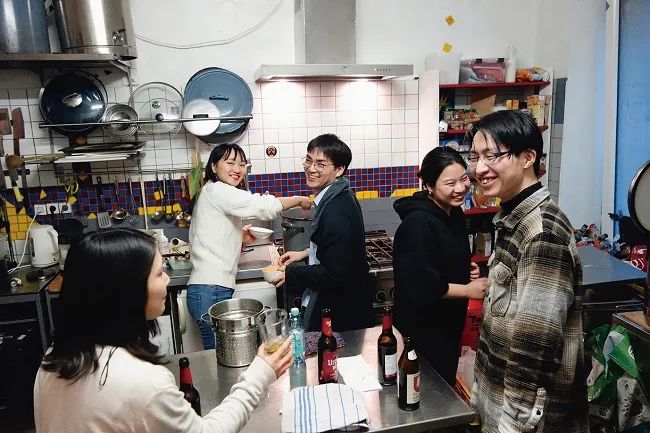
J:
我们实在不能高枕无忧。每周通过我们的社交媒体渠道做广告非常重要,让人们知道我们还在这里。
We really can't sit back and relax. It’s important to advertise through our social media every week so people know we are still here.
对于“适合每个人的厨房”(Küfa),我们有一定比例的常客,他们总是来,因为他们没什么钱。事实上,食物是免费赠送的,柜台上有一个捐款箱,任何人都可以给我们捐赠点什么,我们建议大家捐点钱,大概 1 到 3 欧元就行了。如果你一无所有,也不需要捐赠任何给我们。也会有一些流浪汉和穷人来找我们,大约 10 到 15 个左右。除此之外我们也必须得大力宣传,因为在莱比锡活动真的很多,这里有很多年轻人,每周他们都会在某个地方举办一些活动。所以我们得通知大家,比如音乐会或者其他的活动。我们有一个Telegram 的群,目前有大约 700 名成员,几乎所有的事情都通过这个群发布出去。再加上 Facebook 和 Instagram,我们仍然可以在那里宣传到一些人。
We have a certain percentage of regular guests at KUFA. They always come because they have little money. The fact is that the food is given away for free, but there is still a donation jar on the counter and anyone who wants can donate something to the house. Most also give something, between one and three euros. If you have nothing, you don't need to donate anything. Homeless people and people who have no money sometimes come to us. That's about 10-15 people. The rest of the people come because they know us or have heard of us or to meet friends. We have to advertise ourselves every week because there is of course a lot going on in Leipzig. A lot of young people in Leipzig and there is an event somewhere every weekend. So we have to let you know when we have a concert or something else. We mainly use our Telegram channel, which currently has around 700 people subscribed to it, and that's where most of our stuff happens. Plus Facebook and Instagram, we still reach some people there.
L:
好的,我明白了。那现在谁是团队的成员呢? 你刚刚提到了最初的成员。
Okay, I understand. So who are the members of the team now? You just mentioned the original members.
J:
这是一个有趣的点。自2016 年以来我们一直在这里,而在这七年里,团队已经更替了三次。这意味着,当初在场的人,已经不复存在了。除了 Tino,我们的成员完全更替了。
That's an interesting point. I think this question is a good one because I've been here since 2016 and in that time so far, i.e. in seven years, the team has changed for the third time. This means that those who were there at the beginning are no longer there at all. Not a single one, but one, Tino. But otherwise, we switched things up completely.
但我想这也是我们的一个优势,因为总是有新的想法,新的人,新的动力。我觉得如果一直是同样的人按照同样的方式做事,这是一件危险的事情。而且我们有一个很好的更替。很多年轻人的加入带来了全新的想法。这里也没有人扮演老板,没有人固执己见,如果有人愿意接手和管理,我们会放手交给他们去做。
I think that's exactly one of our strengths. because there are always new ideas, new people, new powers, and new impulses. I think it would be dangerous if it had always been the same people who had always done the same thing for years without making any changes. But this way we have a good mix, new energy. There are also a lot of young people who are new and have completely different ideas than I wouldn't even think of. And nobody plays the boss here. That means if someone wants to take over and manage, we‘ll let them do it.
L:
在组织方面,你们也总是即兴的吧?顺其自然,随遇而安。
Ok, then you are also spontaneous when planning and organizing, right? The way it comes, that’s the way it happens.
J:
是的,常常如此。有时是优势,有时又是障碍。我们早上有时甚至不知道晚上谁做饭。因此,这意味着我们必须迅速组织并完成工作。有时这很烦人,所以多一点结构对我们来说是有好处的。我们也希望可以多一点组织性。所以我们正在筹划 11 月底召开一次大型会议来讨论来一并解决这些问题。
Yes, often. But what is sometimes an advantage can also be a hindrance. Often we don't know in the morning who will cook in the evening. We then have to organize something quickly. That's annoying sometimes. So a little more structure would be good for us. We are currently in the process of building this. At the end of November, we have a big meeting where we would like to sort this out or do it better, and then we'll see what happens next. But a lot of it happens spontaneously.
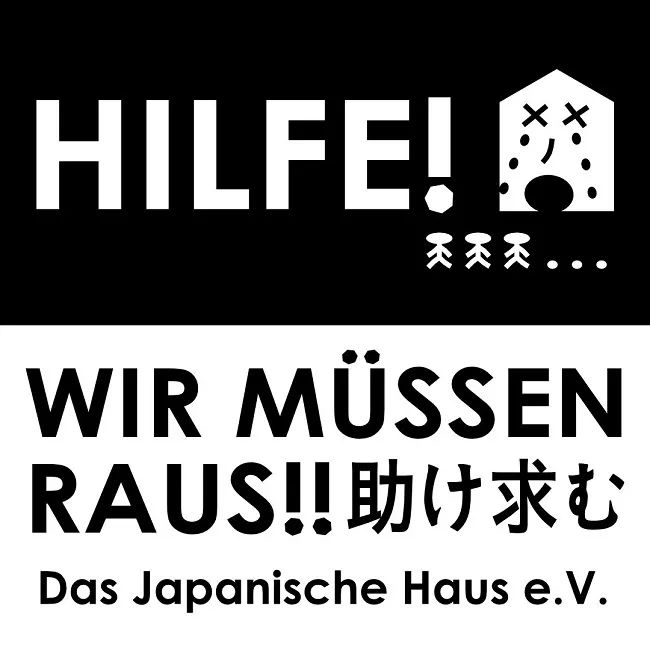
L:
理解了。能说说之前你们搬家的时候发生的事情么 ? 究竟发生了什么?你们从中学到了什么经验 ?
I understand. What was it like when you had to move? What exactly happened and what did you take away from the experience?
J:
嗯,令我们非常失望的第一件事是,我们在那里租了十年。我们从未拖欠房租,总是按时付款,每次房租上涨我们也都欣然接受的配合了。生活一直都很顺利,但突然收到了合同终止通知。他们说欣赏我们的文化项目,很希望能留下我们之类之类的,然后就将房屋解约通知摆在桌上,而且没有与我们提前商量。这非常不公平。
Well, the first thing that disappointed us was that we were tenants there for ten years. There were never any rent arrears, we always paid on time, and we went along with every rent increase. There were never any problems with the police and yet the termination came overnight without speaking to us first. That disappointed us. Although we were told, yes, we like your cultural offerings, we would like to keep you, blah, blah, blah. But then just slamming the resignation on the table without talking to us first, wasn‘t fair.
我们这栋楼实际上是一个小型文化中心。日本之家位于前楼,庭院里有一个自助自行车修理厂。除此之外,还有一个名为 Trautmann 的文化协会,他们为不同的团体提供场地,也举办自己的活动、派对,即兴演奏,音乐会等等。所以我们是真正的小文化中心,突然就被摧毁了。我们这三个地方都被解约了。他们给了我们一个讨厌的提议,要么我们搬走,要么让我把我们的朋友赶走,然后我们搬到后面的房间。对我们来说完全不能接受,因为那是最卑鄙的解决办法。
And I don‘t know if you know this, but we were a small cultural center. We were in the front building, the Japanese House, and in the back yard was a bicycle repair shop, and a self-help workshop. And above that, there was another cultural association called Trautmann. They also made their space available for various groups and held events themselves, parties, and so on. Or jam sessions, concerts, and other things. So we were a real little cultural center that was suddenly destroyed. All three were terminated immediately, at the same time. We were offered, and I find it quite deceitful, that we could stay here, but we had to go into the backyard. That means we throw our friends out and then we stay. It‘s unacceptable to us because that"s the most nasty solution.
因为房屋解约通知很草率 ,里面有很多错误。解约日期也不对,所以我们试图尽可能地拖延,直到今年三月底我们必须搬出去。整个过程都是经过法庭的。律师告诉我们,我们必须搬出去,但可以得到一些赔偿。我们也很相信这一点,但我们完全低估了德国法律体系的运作方式,整个法律运作其实是很主观的。可以说是取决于法官的个人判断。他从一开始就站在房东一方,淡化了他的错误,就好像那些根本不是问题。我真的非常失望,后来我们就被迫离开了。值得庆幸的是我们在 Gleiserei 这里找到了一个庇护所。他们听说了我们的故事,问我们是否想搬去和他们一起住。
The notice of termination of the house was very sloppy and contained many errors. The termination date was t right either and we tried to delay it as long as possible until we had to move out at the end of March this year. The whole process, of course, went through the courts. The lawyer told us we had to move out but could get some compensation. We also believe this, but we completely underestimated the way the German legal system works. The entire legal operation is very subjective. It can be said that it depends on the judge‘s judgment. He sided with the landlord from the beginning and downplayed his mistakes as if they weren’t an issue at all. I was disappointed and we had to leave. But thankfully we found a place here in Gleiserei. They heard our story and asked us if we wanted to move in with them.
L:
Gleiserei,那是什么地方?也是一个文化项目的房屋吗 ?
Gleiserei, what is that? Also a project?
J:
那是一个团结的房子,房子是属于他们自己的,他们把下面的房间设计成开放空间,但是还没有开始使用,因为没有足够的人员来确保这里可以开展活动。然后他们问我们是否愿意搬来这里。我立刻答应了,因为这里离得不远,而且是一个很棒的地方。自此之后我们作为房客搬进了这里,每周可以使用两次,这不太理想,因为它不像我们的老地方可以整周使用。每周两次对我们来说是相当制约的。我们想做更多的事情。
This is a solidarity house, which means that the house belongs to the people who live in it and they had designed the lowest room on the ground floor as an open space but were unable to use it. They didn t have enough people to make sure there was always something going on here. That‘s why they asked us if we would like to come in here. Of course, we said yes straight away, just because it's not that far away and it’s a great space. Since then we have been staying here twice a week as lodgers. That's not ideal, because we could use the old house for ourselves all week. And here only twice a week. We can’t do as much as we did in the old place. We would like to do a lot more.
L:
除了你们希望每天都能使用之外,你们理想的空间是什么样的 ? 你们有什么样的想法 ? 你们需要更大的空间还是好位置 ?
What would your ideal space look like, apart from the fact that you want to use it all week? A bigger space or a good location?
J:
如果是这么大的空间就太棒了,我们需要一个专业配备的厨房。这非常重要,因为我们经常做饭。而且它必须相对安全,以免再次被赶出去。但现在找不到这样的地方。这几乎是不可能的。
It would be great for such a big space. Of course, we need an almost professionally equipped kitchen. This is very important because we cook a lot. And it would have to be relatively safe in order not to be canceled again. But at the moment you can‘t find anything like that. This is almost impossible.
L:
是的,当先莱比锡的情况太疯狂了,一开始这里有这么多可以利用的自由的空间,而现在…
Yes, it's crazy how things started for you back then with so much free space here that you could just use.
J:
之前的房东大方接受我们,因为没有人想要这些古老的破旧的房间。当我们把它们弄得整整齐齐的,翻新了整个房子,修补了破碎的地方,安装了厕所,做了各种各样的事情,然后十年后,(房东)“谢谢你的翻新,再见!”这个破事这让我气得想吐。
The previous landlord happily accepted us because no one wanted the old, broken room. We renovated the rooms, made them habitable, repaired broken things, installed a toilet, etc., and then after ten years we got “Thank you for renovating, and goodbye!” That‘s not a fair system, it pisses me off.
L:
是的,我完全理解你的心情。 你们现在的处境怎么样?为了生存,你们现在必须定期赚钱。 这与您的原本概念相符吗? 这不是很难吗?
Yes, I think so. And what is it like for you now? You have to earn money regularly to survive. How does this fit with your concept? Isn‘t that difficult?
J:
不,这个概念的运作原理非常简单。从 2011 年以来到现在都一直有效,使我们得以维持下去。需求是一直都存在,人们需要一些便宜的食物,所以我们不会消亡。我们的财务理念是通过捐款获得一半收入,酒水销售获得另一半的收入,同时举办各种活动筹集捐款来获得维持的资金。
No, the concept works quite simply. This has been working since 2011 and is keeping us afloat. That means there are, I estimate, around 40 KUFAs every week in Leipzig. That means the need is there, people need something cheap to eat. So it will never vanish. Our financial concept is to get half of the income through donations and the other half through the sale of drinks.
例如“拉面日”,人们可以来这里品尝美味的日本拉面。 在这样的活动里,人们喜欢捐赠更多,这对我们有好处。更重要的是,人们在这里感到很舒适,很自在。日本之家确实是一个宁静的地方,这里很少有任何麻烦,在这里你可以和任何人聊天,也可以安安静静地喝自己的啤酒,没有争吵,没有嫉妒,我们只有平和与宁静。 这就是我们的理念发挥作用的原因。
We also hold special events to raise money, for example, a ramen day where you can eat delicious Japanese ramen. On days like this, people like to donate more, which is good for us.
More importantly, people feel incredibly comfortable here. The Japanese House is truly a peaceful place. So there is rarely any trouble here. People know that when I go there, I have peace in the evening. I can be with anyone chatting, you can drink my beer in peace and there will be no arguments or envy or anything. Just peace. This is all that makes our concept work.
我第一次来日本之家是在 2016 年。那时它还在原来的地址。在艾森巴恩大街(Eisenbahnstrasse)稍远一点的地方。我的女儿和我一直对日本有好感,所以我们一起参加了各种关于日本活动,例如日本乐队的演出,或者是 cosplay。后来我从奥格斯堡搬到了莱比锡,当我们在寻找关于日本相关的东西时,我们在网上找到了这个“日本之家 ”,我想去看看。等我去到那里,那里一片混乱。我很迷茫,没有人确切知道发生了什么事,但那种氛围吸引了我。
I came to the Japanese House for the first time in 2016. It was still in the old location a little further ahead on Eisenbahnstrasse. I've always had a soft spot for Japan, and my youngest daughter did too. We went to various events together, for example, concerts by Japanese bands or anime and cosplay events. Then I moved from Augsburg to Leipzig and saw what there was about Japan in Leipzig. Then I just found The Japanese House on the internet and thought, take a look. I went there and it was chaotic. So, people were confused. Nobody knew exactly what was going on.
“你好,你好,你叫什么名字,你在干什么,你愿意帮忙吗?”他们立刻抓住了我,然后我就莫名其妙的帮忙切菜。
“Hello, what's your name, what do you do, would you like to help?” They caught me straight away. Then I helped with the chopping and was bombarded with questions.
一开始我以为这里一定有问题。没有人会这么友好。因为我来自巴伐利亚。那里的美好看起来那么不同。能够这么快地与某人友好的开始交谈,不对劲,这里一定有问题。然后我在那里待了 5、6、7、8、9个小时。我们一起吃饭、切菜、做音乐。这也是第一次我与日本人交谈,以前从未有过。我一直想要了解这种文化。这太酷了,单单氛围就太酷 了。我从未经历过这样的事情,在我的日常生活中,这根本不存在。从那时起,我就一直参与其中,并热诚的为它付出。我热爱这个项目。大家也是。
And at first, I thought there must be a catch. No one is that nice. I didn t know that. I am from Bavaria. Niceness looks different there. Getting into a conversation with someone so quickly means something is wrong. There's something wrong, something's wrong. And then I was there for 5, 6, 7, 8, 9 hours. We shopped, ate, and made music together. And it was my first time talking to Japanese people, something I had never done before. I always wanted to get to know this culture. That was so cool, the atmosphere alone was so great that I thought something like that I've never experienced it, it doesn't even exist. You won't find anything like that again. And I've been involved and involved ever since and I love this project. And that's how it is for most people who work on the team here.
L:
那么大家都在做什么的,你在做什么,还有那些帮忙的人都是从事什么的?
So what are the people’s occupations here?
J:
很多人什么都不做。有些人没有工作,有些人只是在做兼职,有些人在接受 Hartz IV ( 德国的一种社会救济制度 ) 的帮助,有些是学生,或者正在这里参加一年的志愿工作的人。 所以情况各异,有固定工作的人很少,大部分人都没有很多钱。而且我认为这也并不是将我们联系在一起的纽带。这实际上并不重要。我们其中也有有两三个收入非常高的人,但他们仍然在我们这里感到很舒服,有大学计算机学教授或物理学家,真的是截然不同的人。即使是有钱的人也在这里感到自在,因为这里并不关乎金钱。
Many people here have no job. Some only work part-time, many are studying, a few live on Hartz IV (a social assistance system in Germany), and some are doing a voluntary year of work here. So I think there are only a handful of people who have a regular job. Yes, different, but nobody has a lot of money. And I don’t think that's something that unites us. That doesn’t matter. We also have two or three people who earn well and still come to us and feel comfortable here. For example, we have a professor of computer science or a physicist from a well-known institute in Germany. So really totally different people. But even those with money feel comfortable here because it's not about money.
L:
是的,我也这么认为,因为你说你的概念按照你描述的方式运作。 在这里提供帮助的人们感到有责任,并且是项目的一部分。 当然,他们还要确保项目继续进行,不希望被破坏,对吗?
Yes, I thought so too because you said that your concept worked the way you described it. The people who help here feel responsible and are part of the project. Then, of course, they also make sure that the project continues, is not ruined, and that there are no disputes. Am i right?
J:
对,就是这样,每个人都享有平等的权利。这里没有老板。我们就是我们。没有人比另一个人更聪明。如果 Daniel 有一个建议,那建议就是建议本身,不牵扯别的东西。这种理念或者方式不可思议地非常有用。有很多不同的情况,在之前我担任巴伐利亚篮球俱乐部主席长达 30 年,那是一个完全不同的工作环境,我再也不想经历如此保守的事了。
Yes, exactly. Everyone has equal rights. There is no boss. We are who we are. No one is smarter than anyone else. If Danyyel has a suggestion, then of course he can say it, just like anyone else. And that works. I know it differently myself. I was chairman of a basketball club in Bavaria for 30 years. This is a completely different league. That is something completely different. I never want to experience something so conservative again.
L:
如何确保这种情况不会发生?
How do you ensure that something like this doesn‘t happen?
J:
老实说,我解释不了。你能帮我解释一下吗 ? (转向 Danyyel )
I can‘t explain it to you, honestly. Can you explain that? (turns to Danyyel )
D:
我这么说吧,我在这个领域工作了很长时间,包括在巴伐利亚待过一段时间。 但巴伐利亚却是一种完全不同的心态。 在莱比锡这里更加开放。 而且更平静了一点,更放松了一点。 在巴伐利亚,您乘坐地铁,然后乘坐自动扶梯上去。 人们都站在右边,赶时间的人可以从左边走过去。 左边很紧,所以你会自然而然地感到压力。 人们的生活只有压力。
Let me put it this way: I was in the field for a long time, including in Bavaria for a while. But Bavaria has a completely different mentality. Here in Leipzig, it's just more open. You're just a little calmer, a little more relaxed. In Bavaria, you take the subway and then you have an escalator up. People are standing on the right, anyone in a hurry can walk past on the left. It's tight on the left, so you automatically get stressed. People are just stressed.
J:
是的,但是为什么这在这里有效行得通呢? 我认为莱比锡东部的情况与莱比锡其他地方有所不同。在我们这里,没有人想当老板,没有人想负责。
Yes, but why does this work here? I think it is different here in the east of Leipzig than in the rest of Leipzig. And with us, no one wants to be the boss, no one wants to be in charge.
D:
对, 因为莱比锡这里更开放,在巴伐利亚或者西德,有很多人对他人品头论足,人们更顽固。
Right, yes. Because here in Leipzig it's more open, in Bavaria or western Germany many want to be bosses, the people are more stubborn.
L:
那么你觉得日本之家的项目可以存活,也是因为在莱比锡这座城市吗?
So your project also works, because it is in the city of Leipzig?
J:
那肯定的,莱比锡是一座很酷的城市。一座年轻的城市,丰富的文化,年轻人也很多。莱比锡的政治环境也很好,即使你现在得不到太多的帮助,但他们已经认识到莱比锡的意义所在。 他们认识到所有这些潜意识的提议(如我们的提议)一样重要,并且已经在力所能及的范围内努力支持这些项目。不过,支援通常需要很长时间才能到达。
Yes for sure. Leipzig is a cool city. A young city, lots of culture, lots of interested people. Politics is also good, I have to say, even if it is you don t get that much help now. But they have already recognized what Leipzig is about. They have recognized all of these subliminal offers, like ours, as important and are already trying to support these projects within their means. Unfortunately, it usually takes a long time for help to arrive.
L:
你们正在寻求帮助吗?
So are you seeking help from the city now?
J:
你是指财政上吗 ? 从财政上来说,如果我们去争取的话,我们可以得到帮助。 国家对项目提供财政支持,非常多样化。可惜目前我们还没有人负责解决这个问题,但这是有可能的。而且政治上的支持越来越多。 当我们被房东退租时,我们没有帮手。但现在,随着时间的推移,我们建立了更多的联系。我们也去了一些城市委员会,并意识到我们肯定能搭上线,得到些帮助。因此,我们应该在这方面做得更多。
Do you mean financially? We could get help financially if we took care of it. There is financial support from the state for projects, very diverse, yes. Unfortunately, we don t have anyone who can take care of this yet, but it would be possible. And political support is increasing. When we were laid off, we had no political helpers. But now as time goes on it's becoming more and more because we're doing more networking. That means we also go into certain city committees and get to know important people. There is help that we can tap into. So it's actually up to us to do more here.
D:
是的,国家为文化和社会项目提供的补贴大约有 3500 多项。 你必须自己去申请这笔钱,而且由于官僚主义,这歌过程通常非常乏味。他们不会直接提供给人们,而是人们必须自己去争取。因为政府希望能够节省的钱越多越好。如果那个人不自己去,不自己问,那就什么也得不到。
That's right, there are approximately over 3,500 subsidies that the state makes available for cultural and social projects. You have to apply for this money and it is often very tedious because of the bureaucracy. That's why you need someone who just takes care of it. People have to do it themselves. If you don't ask, you won‘t get anything. But there is a lot of funding in Germany. However, there are also very, very many organizations that are fighting for it.
L:
这是否意味着您现在不需要资金?
Does that mean you don’t need funding right now?
J:
我这么说吧,我觉得最遗憾的是,这里的人们真的很努力的工作,但却得不到任何回报。我希望能改变这种情况。国家提供了足够的支持。现在必须有人负责让这里得到一些资金,至少我们可以给他们一点东西。除此之外我们不需要太多的资金,因为这么多年来我们一直坚持自给自足。
I will put it this way, what I find most unfortunate is that people here really work their asses off and get nothing in return. I would like to change that. There is enough support from the state. Now someone has to make sure that money comes here so that we can at least give a little something to the helpers. Otherwise, we don‘t need large amounts of money. We have been supporting ourselves for years.
D:
以前我也做过义工类似的事情。我不是球迷,但我有一个同事,他是区级比赛的裁判。他有次和我说,“来吧,Daniel,做点运动,保持健康的同时还可以获取一些小报酬。”然后我就过去负责吹哨子,有时候给十,二十欧元,有时候给一根西班牙香肠,有时候给一杯饮料,有时候给一顿饭。这对我来说没问题。但很遗憾的是,很少有志愿者能从他们的工作中获得任何报酬。
For example, I previously worked voluntarily. I'm not a football fan, but I have a colleague who is a referee in the district and regional classes and he asked me if I would like to referee games. I did it, it's good for fitness and there was always a small reward, 10 or 20 euros, or sometimes a free meal and drinks. That was okay with me. But unfortunately, very few volunteers receive anything for their work.
L:
好的,现在我们离开钱的话题。你们如何看待食物与身份,还有社区的联系?
Apart from the money issue, How do you think food is connected to identity and perhaps also community?
J:
食物能把人们联系在一起,让人敞开心扉。比如当你和家人、朋友在一起吃饭,也会有一种非常特殊的氛围。当你和一群人吃饭和跟同一群人开会是完完全全不同的氛围。因此,食物总是把人们聚集在一起,这就是为什么这个概念行之有效的原因,也许这是个原始古老的方式。我突然想到,我们在烹饪时会使用刀子。但在这里,你不会感到,刀是危险的武器,而是我们之后会共同享受的东西。也就是说,刀在这里失去了作为负面工具的意义。因为人们在这里看到这一切都是无害的,就会感到平和。这就是为什么吃饭、切菜、一起做饭可以迅速将这么多人聚集到一起。
The fact is that food connects and opens people up. You notice this, for example, when you are with your family or with your friends, it is a very special atmosphere. There is a difference when you eat with a few people and when you sit in a meeting with the same people. Food has always brought people together, that's why our concept works. Maybe there's something archaic about it, that's just how the idea came to me. We handle knives when cooking. But here when you cut it you realize that this is not a dangerous weapon. This helps us to have fun together later. This means that the knife loses its meaning as a negatively loaded tool. Maybe you can see it that way. That's just what comes to mind. Because people see that everything is harmless, it becomes peaceful. And that's why preparing, cooking, and eating together immediately brings people together.
L:
你们平时做的菜都是什么样的?
What kind of dishes do you usually cook?
D:
我们几乎只做素食。这是为了满足大多数人,因为我们中有素食者,非常严苛的素食者,来我们这的人也都知道这一点。我们的厨房非常国际化,偶尔有荤菜,但还是以素食为主的。在厨房准备烹饪的同时,你可以一边切菜一边和其他人交流思想,谈天说地。而且还可以学习做饭,分享经验。
We almost only cook vegan. In this way, we reach all people, meat eaters, vegetarians, and vegans. Our kitchen is very international, and of course, sometimes we have some more neutral dishes, but still mainly vegan. While preparing and cutting, you can exchange ideas with others and talk about God and the world. And you also learn to cook, watching others. That is fun.
J:
我们 99% 的烹饪都是纯素的。我们有来自世界 各地的厨师,有秘鲁、印度、意大利、西班牙、非洲、阿根廷、美国、日本、中国、韩国、玻利维亚的大厨师为大家烹饪美食,而且每次都非常精彩。任何想烹饪的人都可以联系我们,和我们一起烹饪。
99 percent of our cooking is vegan. Now and then there is also a bit of meat. It's great, We've had chefs from Peru, India, Italy, Spain, Africa, Argentina, the USA, Japan, China, Korea, and Bolivia, and we've had chefs from all over the world who have cooked for everyone and it was always sensational. If you feel like cooking, you can get in touch and cook with us.
L:
你们经常做同样的的菜吗 ? 还是每周都不同 ?
Do you often cook the same thing or is it different every week?
J:
如果我们找不到厨师,那么通常就是咖喱和米饭,或者一些蔬菜咖喱配米饭。但实际上, 每周都有新菜,连续煮同一道菜两次的情况很少见。
Mmh, if we can t find a cook, if something has to happen spontaneously, then it's usually curry and rice. So some vegetable curry with rice. But actually, there is something new every week. It's rare to cook the same thing twice in a row.
D:
我们总是在盘子上拍一张完成的菜的照片。然后我们会发布在 Telegram 的群里,写道“食物准备好了!”这样人们就可以看到他们将要吃什么。 我们可以自豪地说我们的 KÜFA 是莱比锡最好的素食餐厅。 人们真的很喜欢这里,因为我们还有莱比锡最好的素食厨师大卫。(咧嘴笑)
And we always take a photo of the finished dish on a plate. We then post this in our Telegram group. We write “Food is ready!” so that people can see what they have to eat. It is not without pride that we can say that our KUFA is one of the best in Leipzig. People love this because we also have the best vegan chef in Leipzig, David. ( grins)
L:
我们可以如何支持你们呢?
How could people support you?
J:
我认为你们做这个展览很酷。 仅此一点就对所有朝这个方向发展的项目提供了巨大的支持。 他们选择了我们,我们感到非常荣幸。如果您有想要来欧洲的人,请随时与我们联系,完全没问题。 然后我们会尝试组织一些事情。
So I think it‘s cool that you do something like that. ( the exhibition ). That alone is a huge support for all projects that go in this direction. And we feel truly honored that they chose us. But otherwise, you can only support us by being here in Germany and working directly with us. Or by launching a similar project in China. If you have people who would like to come to Europe, feel free to contact us, it's no problem at all. Then we'll try to organize something.
J:
绝对没错。还有来自中国的年轻艺术家也可以和我们联系! 也许我们可以帮他们找个可以留宿的地方。 但首先先跟我们聊聊。
Absolutely, yes. Also young artists from China. They should contact us. Maybe we can find a place for them to sleep and stuff like that. But firstly, we need to talk to each other.
